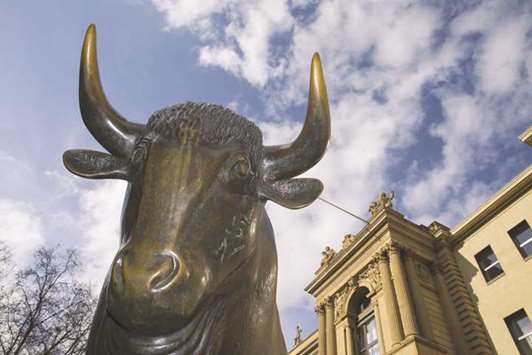The euro fell and eurozone stocks surged after the European Central Bank said it expected interest rates to remain at current record lows for at least another year.
The central bank also slashed its growth forecast for the rest of the year, citing threats of rising protectionism and global trade fears, but still said it would end a mass bond-buying programme.
“The euro and British pound erased early advances versus the US dollar on the heels of the ECB decision,” Charles Schwab analysts wrote.
The ECB call to hold rates until “at least” the summer of 2019 was a surprise to those expecting the central bank to hike rates at least once by then.
“Previously, the market had expected there to be a rate hike in the first half of 2019, which is now no longer the case,” wrote Fawad Razaqzada, technical analyst at Forex.com.
Chris Turner, global head of strategy at ING, agreed. “EUR/USD has sold off hard on the announcement that the ECB ‘anticipates’ ending QE in December this year and keep rates unchanged at least through the summer of 2019,” he said.
“This has come as a disappointment to the rates market, which had priced close to 10bp of ECB rate hikes by June 2019,” he added, noting however that the euro sell-off was probably overdone.
Overall, analysts said the ECB’s exit announcement from bond buying had been well-handled, as it prompted no drastic market reactions.
ING bank analyst Carsten Brzeski called it “a truly Solomonic compromise” between hawks eager to end support for the economy and doves fearful of undermining the expansion. “Nicely done,” he said.
London’s FTSE 100 rose 0.8% at 7,765.79 points, Paris’ CAC 40 gained 1.4% at 5,528.46 points and Frankfurt’s DAX 30 closed 1.7% up at 13,107.10 points, while the EURO STOXX 50 ended 1.4% higher at 3,527.11 points yesterday.
The rise in stocks came about as a result of euro weakness, which boosts the earnings of exporters, but also because of ECB’s apparent trust in the eurozone economy to manage without its massive assistance in the future.
German 10-year bond yields — kept low for years by the bond-buying programme — eased further by just over 2 basis points to 0.458% from 0.482%, as monetary conditions in the eurozone looked to remain loose.
The ECB’s momentous moves came a day after the US Federal Reserve appeared to take a different path, hiking borrowing costs and signalling several more rises through to the end of next year.
“Following on the heels of the Fed’s change in messaging last night this is quite a big day for policy normalisation — the end of global QE is nigh,” wrote Robert Sierra of Fitch Ratings.

A statue of a bull is seen standing outside the entrance to the Frankfurt Stock Exchange. The DAX 30 closed 1.7% up at 13,107.10 points yesterday.
